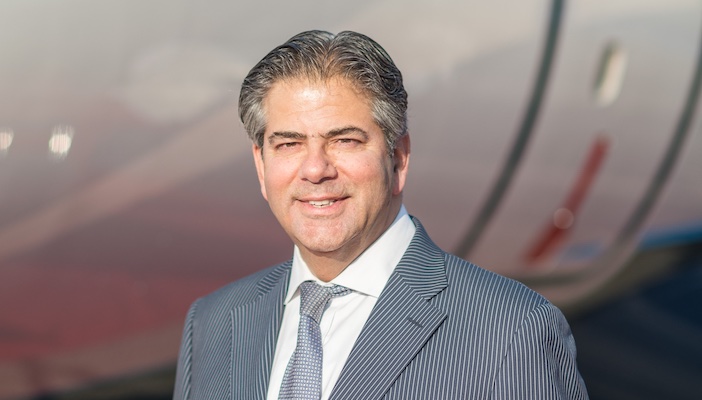The secretary-general of the EBAA smiles as he recollects his first appearance at the EBACE conference in Geneva during May: “I went on stage during the opening speech and my first words were – we’re back. At the time I was referring specifically to EBACE, but now it feels relevant for the EBAA too.”
The European Business Aviation Association (EBAA) has been organizing live events for its members for nearly all of its history. But due to the difficult circumstances of the last few years caused by Covid-19, it wasn’t possible for two years to get its members together in Geneva. Next month the organizations’ Safety Summit will take place in Brussels. The next AirOps event is planned for February next year, which will include an AGM event. “There’s a lot of exciting stuff coming up,” Khan says.
Bounce back
It is clear that Khan is pleased with the performance of European business aviation in the last year and feels positive about the future. “If you look at what’s happened over the last couple of years, we are very enthused and encouraged by the performance of the industry.” he says.
Khan believes the industry is back on a par and consistent with pre-pandemic figures originating in 2019. “We’ve seen an upsurge in traffic and charter engagement. It’s booming and we’re seeing more entrance into the markets.”
Khan puts this down to people finally understanding the flexibility business aviation offers travelers. “We fly when others don’t, that’s been even more prominent during the pandemic, and I think you’ll see that you can see that reflected in the market.”
But Khan’s enthusiasm for the sector’s growth is tempered by the acceptance that the industry will face challenges during the coming years.
“I think we need to be realistic. This is a post pandemic picture that we’re talking about,” he says. “What we will always do as an industry is look for new opportunities. We’re a creative, innovative kind of industry. So, we’re looking at solutions for the upcoming challenges we’ll be facing.”
Supporting the industry
A recent example of the EBAA’s industry advocacy was when French transport minister Clément Beaune called for flights by private jets in Europe to be restricted.
“We have taken note of the current political mainstream that is calling for the regulation of private jet flights more thoroughly at the EU level,” says Khan. “I find this very upsetting, as the unfortunate routes taken includes notions of banning, or increasing taxation which could simply deter the entire industry from operating and developing sustainable technologies.”
Khan says that it is difficult to say for sure if these types of restrictions will happen, but there is a real possibility that the notion of more stringent regulation for the industry will be discussed at the European Council transport meeting in the coming month. “In our conversations with several member states, we feel that there currently are some in favour and some against, which shows how split the opinions are,” he says.
“We are very active with our Council of National Associations to ensure our industry is effectively represented at the member state level. EBAA is having many conversations with our stakeholders and policymakers in the European political process. This effectively means that, apart from speaking with the media and informing people about our industry’s added value to society and European citizens, we are also engaged with political stakeholders to ensure our sector is properly understood and taken seriously.
“We have always argued that business aviation continues to be an early adopter of innovative technologies that improve the efficiency of aviation and innovation should remain at the centre of the European economy. EBAA urges European governments to support these endeavours. In short, don’t stifle an industry of its ability to innovate by implementing policies that could effectively kill the industry altogether,” says Khan.
Advanced Air Mobility
A potentially massive change to the market that is difficult to ignore when discussing growth in business aviation is the introduction of eVTOL aircraft. The EBAA supports the new business models proposed by advanced air mobility (AAM) and urban air mobility (UAM) companies. “We are very excited about developments over the last couple of years. AAM and UAM are exciting new modes of transport and a new innovative part of the market,” Khan says. “It can address several challenges we have today, most importantly they are sustainable solutions. We’re keen for AAM and UAM companies to become members. There is a lot of crossover.
“There will be challenges with congestion of airspace and we need to address the safety challenges. But we already see regulation coming into place to address specifically this new part of the market. I’m positive that will happen.”
Young professionals
Attracting young people into business aviation’s workforce is another crucial area for the EBAA. Khan says, “We are constantly addressing the ambition of being a good long-term employer for young ambitious people who seek a career in aviation, not just for the first couple of years, but to sustain and maintain them in that industry.”
Khan believes it is important for the younger generation to gain an understanding of business aviation, because sometimes the industry is misrepresented in mainstream media. This can cause some challenging discussions with people who have no experience of the sector.
“I think societal relevance for our industry is becoming ever more important, especially with the younger generations,” he says. “My wife and I have a 19 year old son, and you wouldn’t believe the discussions we’re having with him about aviation, including the aviation that his father works in, which is great.
“I welcome those kinds of discussions because it shows us that we need to be on the front foot, we need to be on our toes, and we need to be transparent about what we do.”
However, Khan is not overly concerned about the industry’s image. “I see these discussions as an opportunity. Yes, it creates challenges, but it also gives the industry the chance to talk about what we are about, what we are doing to tackle climate change, how responsible we are, the value we add to society and how innovative we are.”
There have been many sustainable innovations in aviation that originated in business aviation aircraft. Khan believes this high level of innovation will continue as the sector grows to meet new sustainability challenges. Meanwhile the sector must remain as open as possible.
“Justification and transparency are demanded by society, and rightly so. We need to live up to that expectation. You may call them challenges, but I see them as opportunities,” he says.
Education platforms
The EBAA has taken these opportunities and turned them into teaching moments to help highlight the career options business aviation has.
Over the last two years the EBAA has launched numerous courses with universities, specifically on the technical side of the sector, across the continent as well as in the UK.
The EBAA noticed that at most universities offering aviation courses, business aviation wasn’t on the curriculum. The organization has therefore developed a week-long introduction to business aviation module.
The program covers what the industry is, what it’s doing and how you can start a career in business aviation. It is now available at Europe’s leading aviation universities.
“I actually lectured in one of them in France a couple of months ago,” says Khan. “The courses have been overwhelmingly successful, and the professors we’re dealing with, not just in France, but also in a couple of UK universities and Malta are very keen to have us as part of the curriculum.”
The EBAA is trying to replicate this across Europe and aims to have all of the major universities offer tailored education programs, including the technical operational part of the business and the more general management side of running operations.
“The uptake and the responses we’ve been getting from universities and from the students has all been very positive,” Khan says.
The positives keep coming from Khan. Like most people, he is happy to leave the divisive challenges posed by Brexit in the past.
“I don’t want to be dismissive of the operational issues that pop up here and there,” he says. “But in general, we’ve moved on. I’m not hearing any real concerns or worries from members anymore.”
When asked what he believes the greatest achievement of the EBBA has been over the last two years he says representing its membership.
“Our key job is to represent the interests of the membership and the business aviation industry. Without wanting to seem arrogant about it, during the last couple of years we have shed more light on what we are and been effective in getting EBAA a seat at the table with EU policymakers.
“I think we have credibly shown that business aviation is a center of excellence. We’ve been able to raise the profile of the industry and show we are meeting our challenges.
“I think that’s probably the greatest achievement of the EBBA in recent years. I’m proud of the team I have the privilege of leading in Brussels and that together we’ve been able to do that.”





